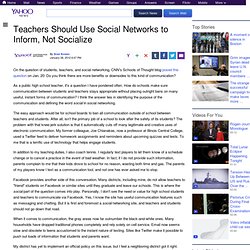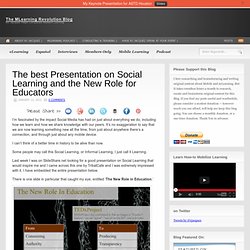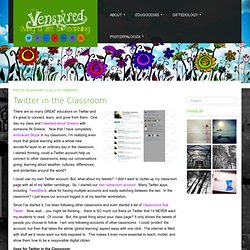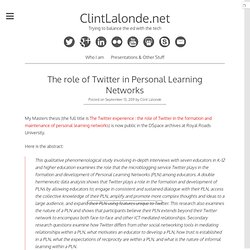

The Social Learning Revolution. Social Media in Education - connect, share, learn, communicate and more. Teachers Should Use Social Networks to Inform, Not Socialize. On the question of students, teachers, and social networking, CNN's Schools of Thought blog posed this question on Jan. 20: Do you think there are more benefits or downsides to this kind of communication?

As a public high school teacher, it's a question I have pondered often. How do schools make sure communication between students and teachers stays appropriate without placing outright bans on many useful, instant forms of communication? I think the answer lies in identifying the purpose of the communication and defining the word social in social networking.
The easy approach would be for school boards to ban all communication outside of school between teachers and students. After all, isn't the primary job of a school to look after the safety of its students? In addition to my teaching duties, I also coach tennis. Facebook provides another side of this conversation. When it comes to communication, the gray areas now far outnumber the black-and-white ones. The best Presentation on Social Learning and the New Role for Educators. I’m fascinated by the impact Social Media has had on just about everything we do, including how we learn and how we share knowledge with our peers.

It’s no exaggeration to say that we are now learning something new all the time, from just about anywhere there’s a connection, and through just about any mobile device. I can’t think of a better time in history to be alive than now. Some people may call this Social Learning, or Informal Learning, I just call it Learning. Last week I was on SlideShare.net looking for a good presentation on Social Learning that would inspire me and I came across this one by TribalCafe and I was extremely impressed with it. I have embedded the entire presentation below. There is one slide in particular that caught my eye, entitled ‘The New Role in Education.’ I wanted to highlight this presentation on my Blog in case you haven’t see it and I’ve reached out to TribalCafe for an Interview on the subject, so I will keep you posted. Twitter in the Classroom.
There are so many GREAT educators on Twitter and it’s great to connect, learn, and grow from them.

One day my class and I tweeted about Greece with someone IN Greece. Now that I have completely embraced Skype in my classroom, I’m realizing even more that global learning adds a whole new wonderful layer to an ordinary day in the classroom. I started thinking, could a Twitter account help us connect to other classrooms, keep our conversations going, learning about weather, cultures, differences, and similarities around the world?
I could use my own Twitter account. But, what about my tweets? Since I’ve started it, I’ve been following other classrooms and even started a list of Classrooms that Tweet. Uses for Twitter in the Classroom: 1.) 140 a day Learning Log: Ask a student to tweet “What did we learn today?” 2.) 3.) 4.) 5.) 6.) 7.) Tips: 1.) 2.) 3.) 4.) I’m really just starting this journey with my class and I can’t wait to see where it takes us. The role of Twitter in Personal Learning Networks. My Masters thesis (the full title is The Twitter experience : the role of Twitter in the formation and maintenance of personal learning networks) is now public in the DSpace archives at Royal Roads University.

Here is the abstract: This qualitative phenomenological study involving in-depth interviews with seven educators in K-12 and higher education examines the role that the microblogging service Twitter plays in the formation and development of Personal Learning Networks (PLN) among educators. A double hermeneutic data analysis shows that Twitter plays a role in the formation and development of PLNs by allowing educators to; engage in consistent and sustained dialogue with their PLN, access the collective knowledge of their PLN, amplify and promote more complex thoughts and ideas to a large audience, and expand their PLN using features unique to Twitter.
First, to the 7 participants in the study, thank you for your time, your voices and your stories.